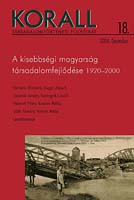Hatalom, szakértelem, átalakulás A szocialista modernizáció kezdetei Románia egy elmaradott régiójában
Power, Expertise, Transformation
Author(s): József GagyiSubject(s): History
Published by: KORALL Társadalomtörténeti Egyesület
Keywords: social history; 20th century; Hungary; Hungarian minority; Romania; socialism; modernisation; industrialisation
Summary/Abstract: In Romania, the modernization process characteristic to socialism gained impetus at the end of the ‘fifties. The result of this was that concentrated resources were utilized for a short term to support consumption, in a way that ensured clearly felt increasing prosperity for the population, providing communities and individuals with a possibility to accumulate wealth. Such modernization affected the more backward regions of Transylvania, thus the Seckler region too. Statistics indicate that the changes were the greatest at the end of the ‘seventies. Industrial production volumes, employment figures, real incomes and consumption increased. During the period, the accumulated basis was the highest between 1975–1980 and the most industrial products were manufactured at the beginning of the 1980s. Production, however, fell back during the final years of the period. The great political turn was witnessed by a declining country in a state of increasing economic and moral crisis. Underlying all this is a massive change in lifestyles and we may discern the outlines of a major socio-historical turn. This is not a closed period yet; it is even difficult to pinpoint the boundaries of the turn. The processes of the 'seventies slowed down during the 'eighties, and became chaotic and multidirectional during the 'nineties. To date, Romania’s most successful period during the post-WWII era is that of post-Stalinist development.
Journal: Korall - Társadalomtörténeti folyóirat
- Issue Year: 2004
- Issue No: 18
- Page Range: 135-154
- Page Count: 20
- Language: Hungarian

